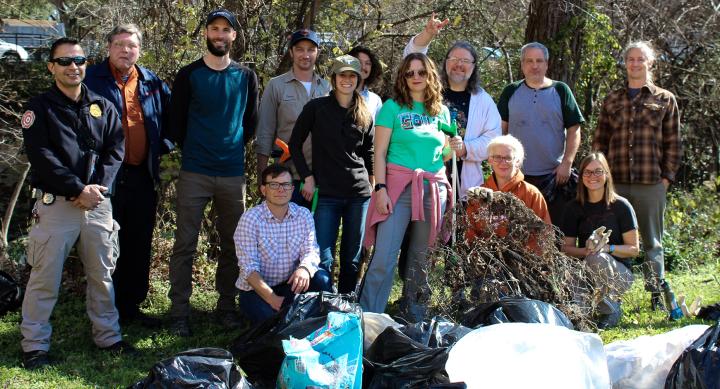
UT Staff Council's Sustainability Committee hosts a spring clean-up of Waller Creek.
Staff value sustainability in a fundamentally different manner than students or faculty. Staff consider the institution primarily as a place where they practice their craft or profession and earn a living, but collegial partnerships and personal friendships flourish as well. A positive campus culture is built on efforts to create strong benefits and services, opportunities for leadership and career growth, and is enhanced by sustainability programs to make the workplace healthier, more comfortable, and a contributor to a cleaner environment.
Staff are entrusted to be caretakers of the University's resources. As such, we encourage staff to engage in sustainability on campus through the following programs and resources.
Green Labs
Green Labs, a program within Environmental Health & Safety, serves as a resource to help UT faculty, staff, and students run more environmentally-friendly labs without sacrificing the integrity of their research. The Green Labs team strives to increase the sustainability of labs on campus by helping researchers minimize waste, reduce water and energy consumption, and utilize the concepts of Green Chemistry.
Zero Waste Program
Resource Recovery's Zero Waste Program offers many resources to support staff in reducing waste while on campus including the Zero Waste Workplace Program and Zero Waste Events. Their website also includes helpful information about how to properly dispose of items on campus from batteries to plastic bottles.
Course Development Awards
The Sustainability Course Development Awards are designed to incentivize the development of new sustainability courses or the conversion of existing undergraduate courses. Courses should investigate sustainability issues while incorporating an aspect of experiential learning, allowing undergraduates to engage with a real-world problem through research or on-the-ground work. Preference will be given to courses that are designed to be interdisciplinary and that are open to students from multiple colleges and/or majors.
Read about past award winners:
- 2017-2018 Sustainability Course Development and PLUS Award Winners
- 2015-2016 Sustainability Course Development Award Winners
- 2014-2015 Sustainability Course Development and PLUS Award Winners
- 2013-2014 Sustainability Course Development and PLUS Award Winners
UT Staff Council
UT Staff Council and its Sustainability Committee maintain a close strategic relationship with the Office of Sustainability, providing an outlet for staff to collaborate on and find a voice in sustainability-related initiatives at the university.
Staff value sustainability in a fundamentally different manner than students or faculty. Staff consider the institution primarily as place where they practice their craft or profession and earn a living, but collegial partnerships and personal friendships flourish as well. A positive campus culture is built on strong benefits and services, opportunities for leadership and career growth, and is enhanced by sustainability programs to make the workplace healthier, more comfortable, and a contributor to a cleaner environment.
UT Catering and Food Vendor Sustainability Database
The UT Catering and Food Vendor Sustainability Database provides UT-Austin meeting and event planners with information on the sustainability attributes of over 70 area food vendors. All information in the database was self-reported by the food vendors, and information will be updated annually. If you are a local food vendor and would like to be included in this database or if your business's information needs to be updated, please contact sustainability@austin.utexas.edu. This resource was developed through the collaborative effort of the Office of Sustainability, the Staff Council Sustainability Committee, and Resource Recovery. Resource Recovery has also created a helpful Zero Waste Event Food Vendor Conversation Guide to help you navigate and facilitate conversations with food vendors about zero waste and sustainability.
Green Fund
The Green Fund is a competitive grant program funded by UT Austin tuition fees to support sustainability-related projects and initiatives proposed by university students, faculty, or staff.
Sustainability Roundtable
The Sustainability Roundtable is a regular meeting of sustainability staff from across campus that fosters collaborations in support of our campus sustainability goals. Contact sustainability@austin.utexas.edu for more information.
Institutional Memberships
- Association for the Advancement of Sustainability in Higher Education (AASHE): AASHE's mission is to inspire and catalyze higher education to lead the global sustainability transformation. Create a free account using your university email address to access webinars, case studies, toolkits, and an active community discussion board. AASHE also hosts the annual Global Conference on Sustainability in Higher Education.
- Sustainable Purchasing Leadership Council (SPLC): Register here using your UT email address to gain full access to a wide array of sustainable purchasing resources and community discussion boards. Resources include case studies of successful sustainable purchasing initiatives and guidance for specific purchasing categories (e.g. furnishings, paper products, electronics, etc.). Watch a recording of the SPLC member orientation for UT Austin here. For SPLC, sustainability includes social, economic, and environmental stewardship. Sustainable purchasing is purchasing that builds healthy communities, economies, and environments all along local and global supply chains.
- US Green Building Council (USGBC): USGBC is committed to transforming how buildings are designed, constructed and operated through LEED (Leadership in Energy and Environmental Design). Open to full-time UT staff, contact us to receive information on creating a free USGBC account and gain access to LEED courses, credential maintenance webinars, and USGBC events.
Join Us
- Sign up for our Bleed Orange, Live Green newsletter.
- Follow us on Instagram.
- Check out Hornslink for more organizations that promote sustainability.
